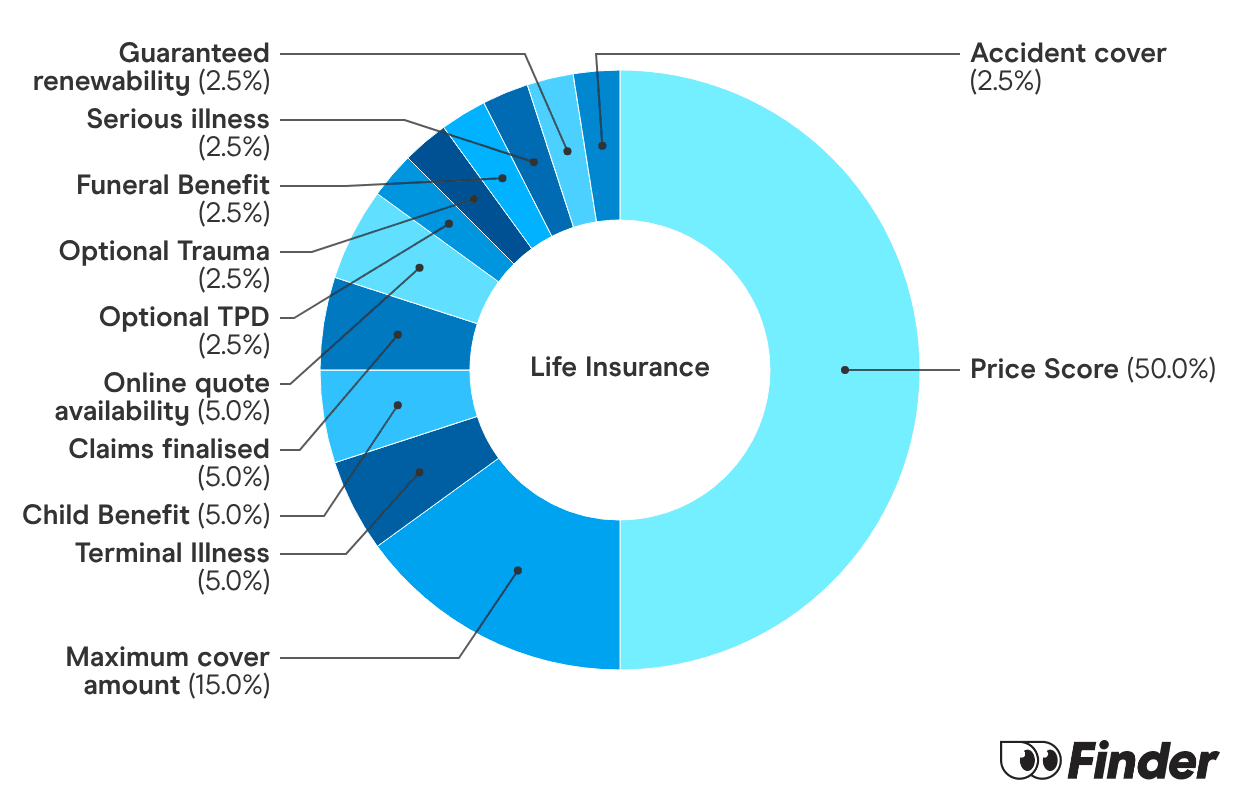
Personal insurance is a type of cover that provides financial security to you and your family for events such as a serious injury or illness, loss of ability to earn, total and permanent disablement or even death. It can maintain your way of living, with financial support to cover any outstanding debts and everyday expenses.
Compare your personal insurance options & get quotes quickly
Compare other products
We currently don't have that product, but here are others to consider:
How we picked theseCompare other products
We currently don't have that product, but here are others to consider:
How we picked theseFinder Score - Life Insurance
Life Insurance is a little complicated and a lot overwhelming. That's why we made the Finder Score, to make it easier to compare Life Insurance products against each other. Our experts analysed over 30 products and gave each one a score out of 10.
But a higher score doesn't always mean a product is better for you. Your situation is unique, so your policy choice will be too. Don't think of Finder Score as the final word, but as a good place to start your life insurance comparison.
Why compare life insurance with Finder?
-
You pay the same price as buying directly from the life insurer.
-
We're not owned by an insurer (unlike other comparison sites).
-
We've done 100+ hours of policy research to help you understand what you're comparing.
What is personal insurance?
Personal insurance is an umbrella term used to describe insurance that's designed to cover you and your family from 'life events'. This could be to protect you against a serious injury or illness, an unexpected loss in your ability to earn an income, total and permanent disablement or even death.
You might consider personal insurance during big life events, such as after you switch jobs, have children or buy a home.
What are the main types of personal insurance?
There are 4 core types of personal insurance: Life insurance, Total and permanent disability (TPD) insurance, Critical illness insurance and income protection cover. Some have similar features and benefits, and they've each been to give you peace of mind and protection.

Life Insurance
Life insurance is set up to pay a lump sum to your dependents if you die or suffer a terminal illness during the term of your policy. It pays a lump sum benefit, which can be used in any way your financial dependents deem to be necessary. Life insurance proceeds can be used by the family to:
- Pay for funeral expenses
- Pay off mortgage and other financial obligations that have left behind
- Take care of your estate planning needs
- Pay for other extra expenses your family might need
- Provide a reserve for your spouse should they decide not to work anymore.
With term life cover, you can choose the period of time you would like to be covered for, typically for 5, 10, 20 or 30 years. When deciding the right term for your situation, it is important to assess your short and long-term financial commitments, future expenses, and the duration of time that you want to continue providing for your family.

Income Protection Cover
Income protection cover replaces up to 70% of your income if you're no longer able to work after an accident or illness that means you are temporarily unemployed. A monthly benefit is paid out every month until you are able to go to work again. Income replacement premiums are generally tax-deductible, but the benefit payments will be taxed, as they are treated just like a regular income.
Income protection can be used for the following benefits:
- Helps you with daily expenses, such as bills and food
- Pays the rent or costs of maintenance
- Helps pay mortgage and other debt repayments.

Critical illness (or trauma cover)
Critical Illness insurance pays you a lump sum upon diagnosis of a traumatic medical event, such as heart disease, cancer, or stroke. Also commonly known as Trauma Insurance, Critical Illness insurance can be a great help when you are going through tough medical situations by providing an alternative source of funding to your financial commitments, so that you can focus on getting better.
Critical illness policies may cover up to 50 different types of medical conditions. However, it's important to note that the definition and medical events that are covered may vary from provider to provider (for example, heart attack). Therefore, it is essential to ask your insurance provider of what is and is not included in your policy before signing on the dotted lines.
Critical illness insurance can:
- Cover your medical expenses
- Purchase medical equipments to aid your recovery
- Pay rehabilitation costs
- Cover the hire fees of a nurse/housekeeper
- Home modifications
- Provide funds for a holiday for you and your family to recuperate
- Gives extra income to your family to keep up with ongoing financial commitments.

TPD Insurance
TPD cover provides a lump sum payment to help you cover for the costs and expenses incurred when you have been rendered permanently disabled, due to a serious illness or injury, and it's unlikely for you to return to a full working capacity in the future. This lump sum benefit can be used by you and your family to:
- Pay for medical expenses
- Pay for your rehabilitation costs
- Cover fees on hiring a nurse/housekeeper
- Modify your home and vehicle to cater to your new condition
- Keep up with daily living expenses and other immediate financial commitments.
In short, Total and Permanent Disability insurance allows you the financial freedom that could otherwise be difficult to achieve when you become disabled. TPD insurance can ease the stress of the situation and you can have the peace of mind knowing that there is a financial backup to fall upon despite of your new condition.
Compare quotes for personal insurance from Australian brands
4 more types of personal insurance you might consider
- Personal accident insurance. This type of insurance, which is sometimes known as 'personal accident and sickness insurance', is designed to replace your income if you're temporarily unable to work after an accident. It's usually a short-term cover option – it's often limited to 12 months or 2 years, whereas income protection may be longer — that can help to ease the financial stress that can accompany a serious accident, especially if you're out of work and facing expensive medical bills, so you can concentrate on recovery. Read more about how personal accident insurance works.
- Landlord protection insurance is an important product if you own property that's rented out to tennants. It offers insurance against financial losses should your tenant not pay rent, steal from your property or create damage that needs repairing. It will also give you cover against any legal liability claims made by anybody on the property who suffers an injury for which you can be held to be liable.
- Car insurance is crucial to get on the road. The main types of car insurance you can take out are compulsory third party (or CTP cover) and the other comprehensive insurance. CTP insurance protect you from any personal injury claims brought against you as a result of any accidents occurring in which your motor car is involved. Comprehensive motor car insurance covers you against any damage your car might do to another vehicle as well as damage sustained on your own vehicle along with any injuries resulting from the collision.
- Travel insurance is important if you are travelling away from home and need help. It will pay for you to return home urgently to attend to any emergency that might arise and it will pay for any urgent medical care you might need while away from home as well as for any lost luggage. Travel insurance can also be used to cover you for any financial loss should you have to cancel your holiday plans before you even get to leave home.
Need more help with personal insurance? Get in touch with an expert broker
Frequently asked questions
Sources
More guides on Finder
-
Budget Direct Life Insurance review
Budget Direct's life insurance offers a high maximum cover limit, decent policy add-ons and competitively-priced cover.
-
Best Life Insurance Australia
Read our comprehensive guide to finding the best life insurance policy for your situation.
-
ahm life insurance review
Read our comprehensive review of ahm Life Insurance to find out if it's right for you.
-
Life insurance rewards programs
Here are some of the health reward programs and discount schemes available from Australian life insurance brands.
-
TAL Life Insurance Review
Compare TAL life insurance policies and receive a quote for cover for the different policy options available.
-
Life Insurance Deals and Discounts February 2026
Find the latest life insurance deals and discounts from Australian brands.
-
Medibank Life Insurance Review
Choose a flexible life insurance policy that meets your needs with Medibank life insurance.
-
AAMI Life Insurance Review
Compare policies on offer from one of Australia's leading general insurance providers, AAMI.
-
Is life insurance worth it?
Having the right life insurance policy is invaluable if something happens to you unexpectedly. Find out what makes your policy worthwhile.
-
NobleOak life insurance review
Looking for a direct insurance company that offers affordable, straightforward cover options? Discover the benefits of NobleOak life insurance.


